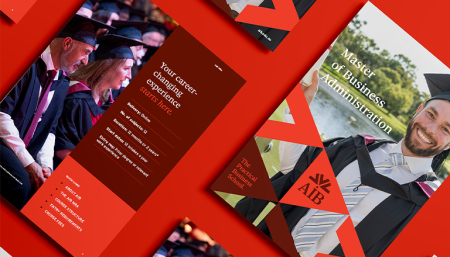2025 success formula: Mindset, goals & steps for year-long motivation

A new year inspires fresh goals and ambitions, but let’s be honest – Most people lose motivation within a few weeks. Why? Because success isn’t just about setting goals, it’s about having the right mindset, habits and adaptability to stay on track.
Success in 2025 requires both the right mindset and a solid plan. Whether you’re an MBA student, a working professional looking to level up or simply someone focused on personal growth, this guide will help you develop a productive and inspired success system that keeps you motivated all year long.
Step 1: Shift your mindset for success
The best goals and plans mean nothing without the right mindset. Many high achievers aren’t necessarily smarter or more talented; they simply view obstacles as opportunities to grow rather than reasons to give up.
One of the most important mindset shifts is adopting a growth mindset. This is the belief that intelligence, talent and abilities aren’t static, but can be developed through effort, learning and persistence. Success isn’t about where you start but about how consistently you push yourself to improve. Whether you’re stepping back into study after years in the workforce or learning a language later in life, approaching challenges with curiosity rather than self-doubt will make all the difference.
Another critical shift is learning to reframe failure. Many people avoid challenges because they fear making mistakes, but setbacks are part of the learning process. The most successful entrepreneurs, executives and academics have all encountered failure, but they used those experiences to refine their approach rather than abandon their goals.
Finally, understanding your motivation is essential. People who stay committed to their long-term goals typically have a mix of intrinsic and extrinsic motivation. External factors such as financial rewards or career advancement, often provide an initial push. However, internal drivers such as the desire for personal growth, providing a better lifestyle for your family or being able to contribute to meaningful causes give deeper, long-lasting purpose. When your external goals align with your personal values you’re more likely to stay focused even when challenges arise.
If you’re interested in learning more explore our top 5 tips for developing a success mindset.
Step 2: Set effective goals
Once have the right mindset, it’s time to set goals that will keep you motivated throughout the year even when results take time. People often set vague resolutions which leads to losing momentum because there’s no clear roadmap. Instead, effective goal setting requires clarity, structure and flexibility.
One of the best ways to approach goal setting is by using the SMART goals framework:
- Specific: Be clear about what you want to accomplish. Instead of “I want to advance in my career,” try “I want to learn a new skill and apply it to a project within the next six months.”
- Measurable: Define success in a way you can track. If you’re studying this could be maintaining a certain GPA or dedicating specific hours each week to studying.
- Achievable: Set realistic targets. If you’re balancing studies with work or family, aim for progress that challenges you without leading to burnout.
- Relevant: Ensure your goals align with your long-term vision. Whether you’re aiming to transition into a leadership role, switch industries or start your own business, tailor your goals to support that vision.
- Time-bound: Attach deadlines to maintain urgency and accountability. For example, if you’re studying try “Complete my first major assignment one week before the due date to allow for revisions.”
Another useful approach is breaking down big goals into smaller milestones. Instead of thinking of your goal as a long-term endeavour, focus on what you need to achieve this month, this term or even this week. For example, if you wanted to improve your public speaking confidence, your goal breakdown could include:
- Quarterly goal: Deliver a 10 minute presentation with minimal notes.
- Monthly goal: Participate in a public speaking workshop or practice sessions.
- Weekly goal: Record and review a short presentation to identify improvement areas.
- Daily action: Spend five minutes practicing vocal exercises or structuring key points for a speech.
Finally, make your goals visible. Whether you use a digital app or a paper planner, having a tangible reminder of what you’re working toward helps keep your objectives top of mind.

Step 3: Build habits that support your progress
Every major achievement starts with small, consistent actions. Many people believe willpower is enough but in reality discipline alone isn’t sustainable. The real path to success involves building habits that remove friction and make progress feel effortless. When you integrate the right behaviours into your routine, good choices become second nature, even when life throws challenges your way.
Research shows that incremental progress leads to long-term success by reinforcing positive habits. Instead of aiming for perfection, focus on simply getting better each day without the pressure of drastic changes. Start with one or two small habits that support your goal. These small wins create momentum and the more you see progress, the easier it becomes to keep going.
It’s easy to say you’ll study more, network more or exercise more but without a plan, good intentions fade. Make it easier to follow through by setting up simple systems to remove obstacles:
- Want to study more? Decide in advance when and where you’ll do it, and keep your materials easily accessible. Treat it like an appointment you can’t miss.
- Need to network? Set a recurring reminder to reach out to someone in your industry. Keep a short message template handy so you’re not starting from scratch each time.
- Want to exercise? Choose a time that fits your schedule and stick to it. Have a backup plan for busy days such as a quick walk between meetings.
Building effective habits starts with understanding how you work best. The key isn’t to follow a rigid schedule but to find a routine that allows you to make steady progress without unnecessary stress. Instead of forcing yourself to study or work at set times that don’t suit you, experiment with different approaches to see what feels most natural. Maybe you focus best in the morning before the day gets busy, or perhaps short sessions throughout the day help you retain information better.
For those balancing work, study and other commitments, flexibility can make a big difference. AIB’s fully online MBA program provides 24/7 access to course materials, allowing students to fit learning around their existing commitments. Whether that means listening to lectures during a commute, studying over lunch or networking with peers in the evening, finding a way to fit learning into your day helps turn progress into a habit.
Step 4: Stay motivated when challenges hit
No matter how well you plan, obstacles will arise. Excitement can power your initial steps but as time passes and challenges emerge, maintaining that same level of motivation becomes harder. The key to long-term success is knowing how to properly push through obstacles.
If you recognise what’s holding you back you can take small, practical steps to regain momentum. Here are some common roadblocks you might face and how to overcome them:
- Roadblock: “I don’t have time.”
Solution: Take control of your schedule with time-blocking. Identify and eliminate distractions such as turning off notifications, set boundaries and focus on high-impact tasks.
- Roadblock: “I lost motivation.”
Solution: Reconnect with your purpose. Visualise your long-term goals and remind yourself of the rewards ahead. Stay motivated by celebrating small wins.
- Roadblock: “I feel overwhelmed.”
Solution: Break big tasks into smaller, manageable steps. Instead of tackling an entire project at once, just focus on the first step. Progress, no matter how small, creates momentum. Prioritise what truly matters and don’t hesitate to seek support from others.
The “Never Miss Twice” rule reminds us that one slip-up doesn’t mean failure. If you skip a habit one day, try get back on track the next day. Missing one study session, music practice or workout won’t derail your progress but quitting entirely will. Consistency, not perfection, is the secret to long-term success.
Books and podcasts can also provide continuous inspiration and motivation. Here are just a few recommendations if you’re interested in learning more:
- Atomic Habits by James Clear: A practical guide to habit-building.
- Mindset: The New Psychology of Success by Carol Dweck: Explores how shifting your perspective helps overcome challenges.
- The Tim Ferriss Show (Podcast): Insights from top performers across industries.
- HBR IdeaCast (Podcast): Business strategies and leadership tips from Harvard Business Review.
Step 5: Stay accountable and keep adapting
Once you’ve set your goals, it’s crucial to stay engaged with your progress. Tracking your achievements, identifying areas for improvement and adjusting your approach will keep you moving forward.
Regularly checking your progress keeps you focused and prevents minor setbacks from becoming bigger challenges. Set aside dedicated time each week and month to reflect on how far you’ve come and what adjustments may be needed. Ask yourself if you’re moving closer to your goals and whether your daily actions align with your long-term aspirations. The more frequently you assess your progress, the easier it becomes to stay on track and make meaningful improvements.
While self-discipline is important, external accountability can make staying on track much easier. Finding an accountability partner whether it’s a friend, mentor or group, helps you stay committed when motivation dips. The best partners are reliable, share similar goals and offer honest feedback. When you have someone checking in on your progress, you gain fresh perspectives and reduce procrastination. Progress can also feel more meaningful when it’s acknowledged, and having someone to recognise your hard work can make a significant difference.
It’s important to be flexible and adapt your plans as needed, rather than abandon them completely. It’s okay if a strategy that worked before may stop being effective. It is better to recognise when change is necessary rather than stubbornly holding on to an approach that no longer serves you. As long as you keep moving forward, even if the path looks different than expected, you are still making progress toward your goals.
AIB’s flexible MBA structure supports this mindset, allowing students to adjust their study schedules as needed. If you need to take a break between subjects due to personal or professional demands, you can pause and resume your studies when the time is right. We’re here to support you reach your end goal, no matter what your unique journey may look like.
Make 2025 your most successful year yet
Success isn’t about luck or talent; it’s about the mindset you adopt, the goals you set and the habits you build. With clear intentions and consistent actions, you can stay motivated and achieve your ambitions throughout 2025 and beyond.
What’s one step you’ll take today toward your 2025 goals? Share in the comments or tell your accountability partner. It’s time to commit!
Interested in reading more?




